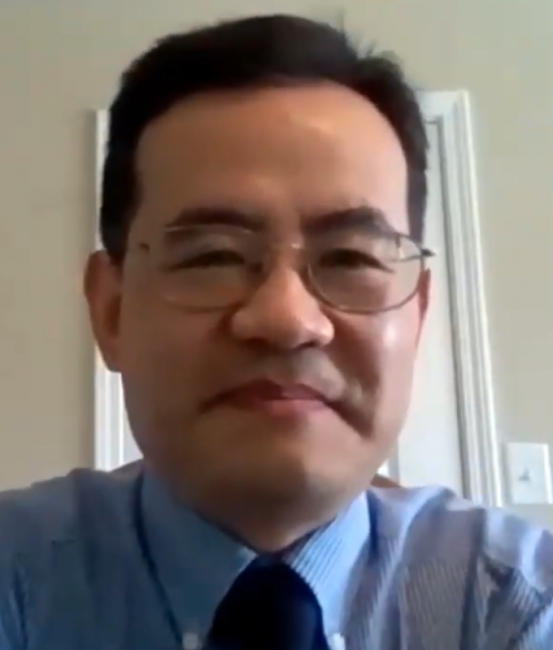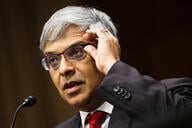You have /5 articles left.
Sign up for a free account or log in.

Anming Hu speaks during a meeting with supporters following his acquittal.
Screenshot/Elizabeth Redden/Inside Higher Ed
Professors at the University of Tennessee at Knoxville are calling for the reinstatement of a former tenured professor who was acquitted this month of fraud-related charges.
Anming Hu, a former associate professor in UT Knoxville’s Department of Mechanical, Aerospace and Biomedical Engineering, was the first professor to go to trial under the auspices of the Department of Justice’s controversial China Initiative, which was launched by the Trump administration with an ostensible focus on prosecuting economic espionage and trade secret theft but which has also targeted more than a dozen academics accused of lying on grant applications or other federal forms.
Hu was accused by federal prosecutors of concealing ties to a Chinese university from the National Aeronautics and Space Administration, which funded his research. After a trial ended with a hung jury, U.S. District Judge Thomas A. Varlan issued a 52-page opinion earlier this month acquitting Hu on all counts, ruling that no rational jury could conclude Hu planned a scheme to defraud NASA.
Now faculty leaders at UT Knoxville are asking questions about the circumstances of Hu’s firing and calling for him to get his tenured professorship back, with back pay.
And they’re raising concerns about what they understand to be the university’s voluntary cooperation with the Federal Bureau of Investigation in its investigation of Hu, a Canadian citizen originally from China.
The Knoxville News Sentinel reported in July that Hu’s trial revealed UT administrators provided documents from Hu’s personnel files without a warrant and without notifying him.
“It’s very disconcerting in terms of what appears to have been initial compliance by the university with racial profiling going on by the FBI,” said Louis J. Gross, the Faculty Senate president and the Chancellor’s Professor and Alvin and Sally Beaman Distinguished Professor of Ecology and Evolutionary Biology and Mathematics at UT Knoxville.
“The faculty would much prefer in situations like that the university would have the faculty member’s back,” Gross said. “Judge Varlan’s statement was pretty darn clear that there was nothing here at all that should have led to anything like this trial.”
Personnel Questions
UT Knoxville administrators did not respond to specific questions but did release a brief statement.
“We understand there are many questions about this case, and some may worry that it has broader implications for our AAPI [Asian American and Pacific Islander] faculty,” the statement says. “To be clear, the university fully supports our Asian faculty, and we are moving forward in support of Dr. Hu’s return to the faculty.”
In a Sept. 10 email to Gross and another Faculty Senate leader, Chancellor Donde Ashmos Plowman said that “the university has communicated to Dr. Hu that if he is able to verify authorization to work in the United States in the next year, the administrative termination will be reversed, and his faculty appointment will be reinstated with expectations in place around disclosures and outside interests.”
Varlan’s ruling noted that Hu did not include specific information about a part-time teaching position with the Beijing University of Technology in the CV he submitted as to UT Knoxville as part of his hiring package, under the employment history section of his tenure application or on annual outside interest disclosure forms and activity reports he submitted to the university. Varlan also noted in a footnote there was some dispute over whether Hu was required to disclose his BJUT appointment on the outside interest disclosure forms.
To Gross, the Faculty Senate chair, the university’s position vis-à-vis Hu seems to be a catch-22. “Professor Hu lost his work authorization due to UTK action so it isn’t clear that he can possibly re-attain work authorization without first having his position and employment here restored,” he wrote to Plowman.
Hu’s termination from UT Knoxville stems from his loss of work authorization in the first place.
UT Knoxville’s Faculty Handbook allows for the suspension of a faculty member without pay, pending completion of termination hearings, if he or she is indicted by a state or federal grand jury on a felony charge.
UT Knoxville says Hu was placed on suspension without pay following confirmation of his indictment in March 2020, and that he remained on suspension without pay through October 2020, when the university received notice that Hu was unable to renew his U.S. work authorization.
“At that point, the university could not legally continue to employ Dr. Hu,” John P. Zomchick, UT Knoxville’s provost and senior vice chancellor, wrote in an Aug. 4 email to Gross laying out the timeline of Hu’s employment.
Zomchick defended the university’s treatment of Hu. “At every stage, the administration has followed the letter and spirit of the faculty handbook in observing Dr. Hu’s tenure rights,” he wrote.
Faculty leaders are not persuaded. A Sept. 13 memo sent by the Faculty Senate’s Faculty Affairs committee to Zomchick notes that according to the handbook, the university is not obligated to place a professor on suspension without pay due to an indictment. “How does the presumption of innocence play into this decision?” committee members asked in the memo.
They also asked, “If the suspension without pay provides cause for the federal government to revoke a tenured faculty member’s work visa, why does this obligate the university to fire that individual? In such a context, didn’t the university’s decision contribute to the revoking of the work visa? Is this outcome consistent with the letter and spirit of the Faculty Handbook?”
“It seems to me the spirit of the Faculty Handbook is you allow people the right to appeal and to be reinstated in their faculty position,” said Mary McApin, a member of the Senate’s Faculty Affairs committee, president of UT Knoxville’s American Association of University Professors chapter and a professor of French.
“What they’re telling him now [is] if he can prove to us that he is able to work in the United States, we will rehire you,” McAlpin said.
“What we’re saying is, why don’t you sponsor him for another H-1B visa, reinstate him and give him back pay, and they won’t say why they won’t,” she continued. “They just keep saying that is a personnel matter.”
A UT Knoxville spokeswoman did not respond to a written question about whether the university is taking any steps to sponsor Hu in applying for work authorization.
UT Knoxville said in its statement that the case was initiated by the U.S. Attorney’s Office. “The university understands its obligations as a federal grantee, respects the role of the judicial system, followed the letter and spirit of the faculty handbook, and was cooperative to all parties involved,” the statement says. “We are pleased the case is resolved and are prepared to review internal policy to see what may be needed.”
Policy Questions
Apart from Hu’s own position, faculty leaders at UT Knoxville also say the case raises broader questions about university officials’ reported voluntary cooperation with the FBI and with what a judge ultimately concluded was a fatally flawed case.
Asian and Asian American civil rights and scientific groups have raised alarms about the China Initiative, arguing that the Justice Department’s approach amounts to racial profiling and that it has resulted in professors facing felony fraud-related charges for disclosure errors that would better be handled administratively as employment matters.
Justice Department officials have denied racial profiling and justified the focus on China in light of what they have described as the unique scope and scale of Chinese government programs aimed at stealing sensitive technology. They also defend the decision to prosecute alleged nondisclosures on grant applications, saying that lying to the federal government is a crime and there is no carve-out for professors.
But the acquittal of Hu comes in the wake of a trail of dropped China Initiative cases. In July, the Justice Department dropped charges against five visiting Chinese researchers accused of lying about ties to the Chinese military on visa applications. The Washington Post also reported last week that the government dropped charges against a heart disease researcher at the Cleveland Clinic accused of hiding ties to the Chinese government on a federal grant application.
Academics have started to organize in their opposition. The president of the American Physical Society, Sylvester James Gates Jr., recently wrote to the Biden administration expressing concerns about the initiative and recommending changes. A group of 177 Stanford University faculty signed a letter last week calling for the initiative’s termination. About 170 faculty members at the Massachusetts Institute of Technology signed a letter in January in support of their colleague Gang Chen, who was arrested under the umbrella of the initiative, and MIT agreed to pay Chen’s legal defense fees. His case is ongoing.
Hu’s lawyer, A. Philip Lomonaco, said Hu did not enjoy the support of his university administrators.
“They were approached by the FBI prior to us even knowing about it, and instead of going to bat for Anming, I think they assumed everything the FBI was saying was true about Anming,” Lomonaco said.
He continued, “The FBI conducted three different PowerPoint presentations to administrators over a three-month period with PowerPoint displays referring to hundreds of pages of documents that they never showed the administrators, and a lot of that was inaccurate -- it had the effect of turning, in my opinion, the administrators against Professor Hu.”
Beauvais Lyons, chair of the Faculty Senate’s Faculty Affairs committee and Chancellor’s Professor in UT Knoxville’s School of Art, said the committee is considering a number of proposed changes to the Faculty Handbook to better protect professors, including a proposed requirement that the university would require a subpoena or open records act request before releasing any information about a faculty member to an outside group or prosecuting state or federal body, and a requirement that faculty members be notified of such a request.
“I must say I think what a lot of faculty wish to hear is some sense of contrition or apology on behalf of the campus administration for having been pressured by the FBI to turn over personnel data,” Lyons said.
“They feel no remorse that they had a tenured member of our faculty who was a productive member of the faculty who they basically hung out to dry here,” he said. “A lot of faculty are concerned about this.”




